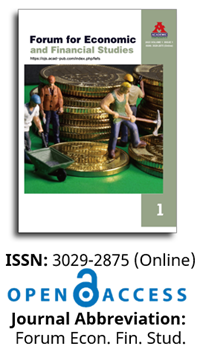Call for papers: Special Issue on 'Climate Finance and Sustainable Development: Green Transition and Innovation under Carbon Neutrality Goals’
Special Issue Context
As global climate challenges intensify, climate finance and sustainable development have become crucial drivers for achieving carbon neutrality goals. This Special Issue focuses on "Climate Finance and Sustainable Development: Green Transition and Innovation under Carbon Neutrality Goals," exploring how financial mechanisms can support low-carbon transitions and promote sustainable development.
Guest Editors
Assoc. Prof. Kai Wu, Central University of Finance and Economics, China
Dr. Jinxin Cui, Zhejiang Gongshang University, China
Dr. Emad Kazemzadeh, Ferdowsi University of Mashhad, Iran
Submission Guidelines
Manuscript type: Original research article, review, commentary, case study, etc.
How to Submit:
(1) Online Submission: https://ojs.acad-pub.com/index.php/FEFS/about/submissions
(2) Submission via Email: editorial-fefs@acad-pub.com
Deadline: January 31, 2026
Peer review: double-blind review
Scopes including but not limited to:
- Impact of carbon neutrality policies on green finance development
- Climate risk pricing and investment decision-making
- Financial innovations for Sustainable Development Goals (SDGs)
- Green bonds, carbon trading, and climate finance mechanisms and instruments
- Energy transition financing mechanisms
- ESG investments and climate risk disclosure
- Sustainable supply chain finance
- Financial support for green technology innovation
- Climate adaptation financing in developing countries
- Financial regulations and international cooperation under carbon neutrality goals
- Climate Finance Innovation and Technology
- Climate Finance Policy and Governance
- Renewable energy and energy efficiency project financing strategies
- Green infrastructure investments and their impact on sustainable cities
We look forward to your attention!
Read more about Call for papers: Special Issue on 'Climate Finance and Sustainable Development: Green Transition and Innovation under Carbon Neutrality Goals’




 Open Access
Open Access



.jpg)
.jpg)

